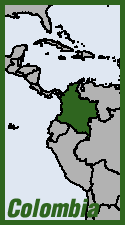 Colombia, long notorious as a violence-torn drug war dystopia, is now set to become a global leader in legal production of cannabis for the medical market. Vancouver-based International Cannabis Corp, also known as ICC Labs, is the latest foreign company to win a production license in the South American country. ICC Labs says it intends to cultivate "non-psychoactive" cannabis plants containing the cannabinoid CBD to produce various medicinal products for domestic and international distribution.
Colombia, long notorious as a violence-torn drug war dystopia, is now set to become a global leader in legal production of cannabis for the medical market. Vancouver-based International Cannabis Corp, also known as ICC Labs, is the latest foreign company to win a production license in the South American country. ICC Labs says it intends to cultivate "non-psychoactive" cannabis plants containing the cannabinoid CBD to produce various medicinal products for domestic and international distribution.
"Obtaining Colombian licenses further establishes ICC Labs as the leading cannabis producer in Latin America and solidifies our international presence in low-cost jurisdictions," said ICC Labs CEO Alejandro Antalich in a Jan. 25 press release. "The Colombian approval process was rigorous and requires, among other things, the creation of social development projects at our cultivation locations."
Antalich said the company's experience in Uruguay, where it has recently planted more than 430 acres of cannabis to be used for CBD oil production, "will give us a competitive advantage over other Colombian license holders."
In fact, Colombia aspires to meet a full 45% of global demand for medicinal cannabis in 2018. The director of the government body overseeing the medical marijuana program, Andrés López, broached that figure in an interview with Radio Caracol (cited in Bogotá's English-language City Paper). He said he anticipated exports to Canada and several Latin American countries, including Argentina, Mexico and Peru. But he also emphasized that Colombia's "internal market is very interesting," saying that the government "has designed a system of rapid implementation, which will permit patients access to these medications."
He noted that another Canadian firm, PharmaCielo Ltd, has begun the process of planting both psychoactive and non-psychoactive medicinal cannabis strains at a nursery in the town of Rionegro, Antioquia department. FCM Global, a Colombia-based firm with Canadian investment, has also announced the opening of a research and development laboratory in La Ceja, Antioquia.
However, in a throwback to the less enlightened days of not very long ago, López's agency has the unappetizing name of the Fondo Nacional de Estupefacientes, or FNE—the National Fund of Stupefying Substances (commonly translated as "narcotics").
And there are more serious throwbacks. Unlicensed cannabis cultivation could continue to come under the same eradicationist and militarized policies as before. The small peasant growers who bore the brunt of the drug war militarization are now demanding a stake in the legal economy, lest it be quickly dominated by industry giants—while nothing changes in the countryside.
The condition that legal producers invest in social programs is an attempt at a kind of "cannabis equity" (as activists in the United States are calling it). But benefitting from the industry and actually having a stake in it are two different things.
Small peasant producers have recently united in a new body called the National Coordinator of Coca, Poppy and Marijuana Cultivators (COCCAM). It has been holding protests over continued repression of peasant cultivators even as the big money pours into Colombia's "green gold rush." On Dec. 16, one local COCCAM leader, Alexander Jose Padilla Cruz, was shot by a solider while harvesting coca leaves on his small farm in Tierra Alta, Córdoba department. TeleSur reports that he was actually cooperating with the National Integral Program for Substitution of Illicit Crops, or PNIS by its weirdly suggestive acronym—designed to wean growers off coca, opium and cannabis with subsidies and investment for legal crops.
COCCAM said in a statement Jan. 19 three of its adherents had been assassinated by presumed right-wing paramilitaries, several more threatened, and 50 families displaced by violence. The statement said that last year, a full 21 COCCAM members were assassinated.
Between licensed cannabis cultivation and a peace process with the guerillas, Colombia has certainly come a long way in recent years. But, clearly, it also still has a long way to go.
Cross-post to High Times







Recent comments
3 weeks 1 day ago
3 weeks 2 days ago
6 weeks 2 days ago
7 weeks 2 days ago
11 weeks 2 days ago
15 weeks 17 hours ago
19 weeks 22 hours ago
19 weeks 6 days ago
29 weeks 6 days ago
33 weeks 6 days ago